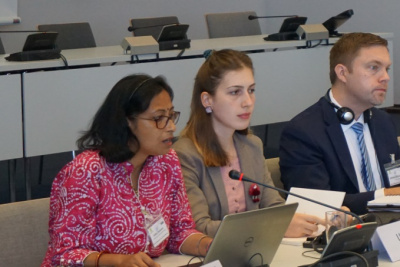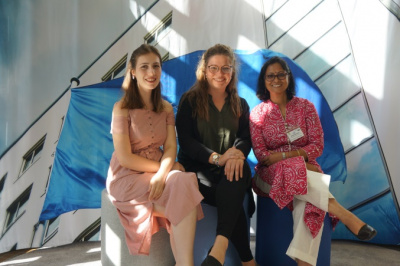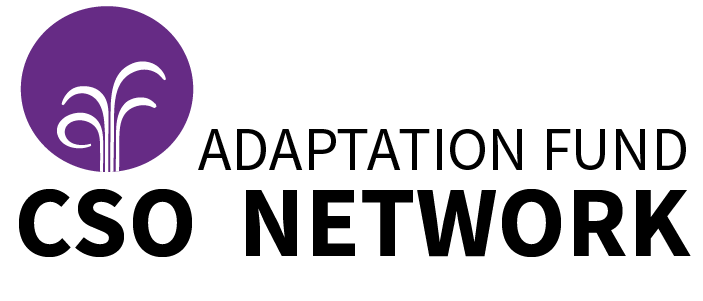Country insights from India and Georgia shared with Adaptation Fund Board

Gitika Goswami (Development Alternatives, India) & Mariam Devidze (Green Alternative, Georgia) providing on-the-ground insights and concrete recommendations on behalf of the AF NGO Network at the Fund's Board meeting in June 2019
AF NGO Network core partner organisations from India and Georgia entered into a fruitful dialogue with the Adaptation Fund Board at the Fund's additional Board meeting on 28 June 2019. The Network provided concrete insights on challenges encountered in obtaining direct access to the Fund's resources and on the implications of implementing the Fund's country cap. On-the-ground perspectives on the role of CSOs as project implementers and gender impacts of the Fund's project in India were also shared.
Civil Society Dialogues at Adaptation Fund Board meetings
The "Dialogue with Civil Society Organisations (CSO)" is a standing agenda item at the Fund's Board meetings. The AF NGO Network initiated this dialogue held between CSOs and the Fund's Board in 2014. The Network has since held more than 15 such exchanges, sharing its lessons learnt and experiences with the Fund's Board. The main aim of the CSO Dialogue is to provide concrete and independent country feedback on the Fund's projects.
At the CSO Dialogue during the Fund's additional Board meeting in June 2019, the AF NGO Network was represented by Gitika Goswami from Development Alternatives in India and Mariam Devidze from Green Alternative in Georgia. Both organisations are not only associate CSOs of the Network, but also represent their region on the Network's governing body. Both organisations independently assessed the Adaptation Fund projects in their countries and voiced their recommendations to the Fund's Board.
The Adaptation Fund NGO Network
Before providing her intervention, Mariam briefed the Board members on the important role and mandate of the AF NGO Network. The Network is a global coalition of more than 250 associate CSOs focusing on the Adaptation Fund. Its aim is to represent the voices of those most vulnerable to climate change and to ensure that they benefit from the Fund. Making the Adaptation Fund work for the most vulnerable communities will strongly rely on the input and engagement of civil society. Find out more about how the AF NGO Network works.
The following recommendations were provided by Mariam and Gitika on behalf of the AF NGO Network during the CSO Dialogue in June 2019:
- Enhance country ownership!
Many regional projects of the Adaptation Fund face the challenge of low levels of country ownership. The Network has observed that there is often limited coordination between a country's national institutions and the multilateral entities implementing regional projects for the Fund. National stakeholders, including the project beneficiaries and decision-makers at governance level, are often not consulted effectively. This previous lack of consultation and the resulting weakened country ownership has caused significant delays in the inception of various regional projects. Regional projects often do not make use of synergies with existing national adaptation initiatives and the capacities of national governments may not be strengthened appropriately during the implementation of such projects. It is important that the decisions taken by the Fund's Board ensure that adequate consultation and involvement of local stakeholders (including both government and local communities) is guaranteed.
- Strengthen direct access!
The direct access modality is one of the key features of the Adaptation Fund, defining its important role in the international climate finance architecture. Through this modality accredited national institutions can directly access the Fund's resources without using multilateral organisations, such as UN organisations or development banks, as intermediaries. However, looking at the long pipeline of regional projects and their accompanying challenges, as well as the worrisome trend of less overall resources being utilised for direct access, the AF NGO Network suggests to the Board that regional projects should fall within the Fund's 50 per cent cap for multilateral implementing entities. This cap limits resources provided to these entities for the Fund's single-country projects to a maximum of 50 per cent of overall resources. However, resources for regional projects are not constrained by this cap, and this is weakening the Fund's potential for direct access in the long term. In addition, the Board should also decide that the 50 per cent cap should not only apply for multilateral implementing entities, but also include regional implementing entities. Such measures would ensure that the Fund's key feature of "direct access" is strengthened.
- Lift the country cap!
The cases of India and Georgia clearly show the limitations of the Adaptation Fund's 10 million USD country cap.
NABARD, India's national implementing entity that obtained direct access with the Fund, successfully submitted a total of six project proposals summing up to approximately 10 Million USD. What is special about those projects is that all of them are being executed by local CSOs, addressing a variety of adaptation needs in several regions of India. NABARD, as well as the CSOs executing the projects, have gained important lessons learnt and experiences which might be important for further projects with the Fund. However, the country cap does not allow India to submit further projects. More than 1.25 billion people living in India's many and diverse regions are facing severe and distinctive adaptation needs, but many are not covered by the current six projects under implementation in India. National institutions have gone through an often-tedious and time-consuming accreditation process with the Fund and by doing so strengthening their institutional capacities and gaining valuable insights and expertise during project implementation. Yet, the country cap prevents them from applying those acquired assets to further adaptation projects.
At the same time, the 10 million USD country cap directly affects countries' incentives to obtain a direct access entity with the Adaptation Fund. There are countries where multilateral institutions (e.g. UN organisations or development banks) have already accessed all the country’s resources available under the country cap to implement concrete adaptation actions. Georgia is one such example.
Thus the AF NGO Network suggests lifting the Fund's country cap in a way that incentivises and strengthens direct access to the Fund's resources.
- CSOs play an important role as project executers!
Local CSOs are often well aware of the adaptation needs of the most vulnerable communities in their country. They have experience with working with local communities and can bridge the gap between the communities and international organisations or government agencies. There are many countries that have used a variety of mechanisms to effectively enhance access to the Fund's resources for local communities by using CSOs as project executers. In India, the Adaptation Fund is currently implementing six projects, all being executed by local CSOs. South Africa also chose to enhance access to the Adaptation Fund's resources by submitting a proposal for a Small Grants Facility to the Fund's Board. Through this Small Grants Facility several local CSOs successfully obtained resources for adaptation action in their communities.
- Increase awareness and knowledge on the Fund!
Designated Authorities and national institutions often lack awareness of the Adaptation Fund accreditation process, resulting in some countries not yet applying to obtain a direct access entity. The Fund's Readiness Programme provides essential support to national entities in the process of accreditation. For example, the Fund enables South-South support as an already successfully accredited entity of one country can support the applicant of another country in preparing for their accreditation. Applicants can also receive support for project formulation and to strengthen the gender policies and environmental and social safeguards of their institutions. Nonetheless, some countries have not yet decided whether they should go for direct access with the Fund or not. Raising awareness among countries’ Designated Authorities on the benefits of direct access and the support provided through the Readiness Programme might help countries to obtain their own direct access entity with the Fund. Interviews with decision-makers that were conducted by Green Alternative Georgia, core partner of the AF NGO Network, confirmed the necessity of increasing awareness and knowledge on the Fund's processes - especially the accreditation process!

Mariam Devidze (Green Alternative), Julia Grimm (Germanwatch) & Gitika Goswami (Development Alternatives) representing the AF NGO Network at the additional Adaptation Fund Board Meeting in June 2019
Board thankful for valuable insights
Sylviane Bilgischer of Belgium, chair of the Fund's Board, acknowledged that the assessments and recommendations from the AF NGO Network are bringing real and additional value to the Fund's operations and the decisions of its Board. Other Board members voiced their gratitude for the Network's intervention and interest in the recommendations provided by the Network representatives. One Board member highlighted that the AF NGO Network's assessments provide valuable information in addition to the Project Performance Reports provided by the Fund's implementing entities themselves. There was also interest in the Network's perspective on how to overcome the apparent gap in ownership for some of the Fund's projects. Another Board member requested that the Fund's Secretariat ensures that the Network's insights and recommendations would be documented and followed up on.
Overall, the CSO Dialogue at the Fund's Board meeting in June 2019 was an important opportunity to enter into a collaborative and constructive exchange with the Fund's Board members.
Contribute to the CSO Dialogue!
Are you an associate CSO of the Network and would you like to contribute to the CSO Dialogue? Have you conducted an independent assessment on the Adaptation Fund's processes in your country that you would like to share with the Fund's Board? Please contact the Network!
Further information on how to contribute to the CSO Dialogue
